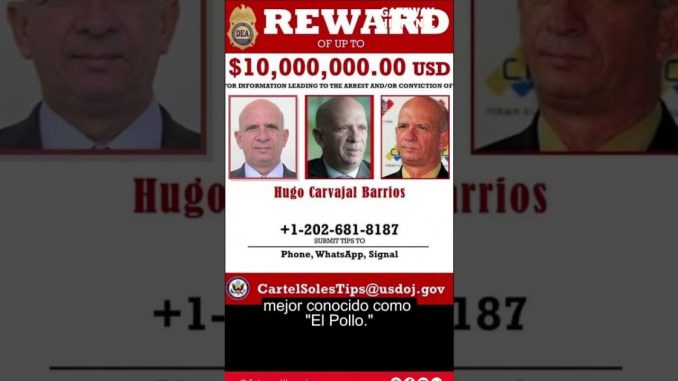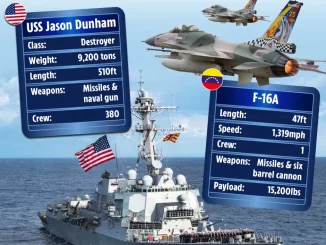
Published July 12, 2025
Hugo “El Pollo” Carvajal: From Chavista Spy Chief to U.S. Drug-Trafficking Defendant
Hugo Armando Carvajal Barrios, 65, was once the powerful director of Venezuela’s Military Intelligence Directorate (DIM) under Hugo Chávez (2004–2011) and briefly under Nicolás Maduro. As a top insider, he played a key role in the so-called “Cartel of the Suns” — a drug trafficking network allegedly involving high-ranking Venezuelan military officials.
🌿 The Charges
-
Narcoterrorism & Cocaine Smuggling: In a New York courtroom, Carvajal pleaded guilty to conspiring to import cocaine into the United States and to working with the FARC — a Colombian guerrilla group designated as a terrorist organization at the time.
-
Weapons & Violence: He also admitted to trafficking military-grade weapons and using violent methods — including kidnappings and murders — to protect drug shipments.
🔍 Timeline Highlights
-
1992: Participated in the failed coup alongside Chávez, beginning his rise in the Bolivarian regime.
-
2004–2011 (and briefly in 2013): Led Venezuela’s military intelligence. During this time, Carvajal allegedly facilitated large-scale drug shipments under military protection (DOJ).
-
2011 & 2014: Sanctioned by the U.S. Treasury for aiding drug and arms trafficking with the FARC.
-
2014: Arrested in Aruba but released after claiming diplomatic immunity.
-
2019: Arrested in Spain under a U.S. extradition warrant. Escaped, but was re-arrested in Madrid in 2021.
-
July 2023: Extradited to the U.S. after a lengthy legal battle.
-
June 26, 2025: Pleaded guilty to four federal charges in New York, including narcoterrorism.
-
October 2025: Scheduled sentencing; prosecutors say he faces at least 50 years or possibly life in prison.
🌍 Regional Impact
Carvajal’s guilty plea confirms the deep involvement of Venezuelan officials in drug trafficking and their collaboration with the FARC to flood the U.S. with cocaine. Prosecutors allege he helped smuggle tons of the drug — even aboard military aircraft.
His case also brings to light broader allegations:
-
Connections between the Maduro regime and international criminal networks.
-
Ties to groups like Tren de Aragua, controversial dealings with Iran, and alleged election manipulation.
While Carvajal has not officially signed a cooperation deal, U.S. prosecutors indicated that he may assist future investigations, which could influence his final sentence.
The U.S. Justice Department has long offered multi-million-dollar rewards for information on corrupt Venezuelan officials — including Maduro himself.
 Resulting Effects:
Resulting Effects:
1. Legal Consequences for Carvajal
-
Severe prison sentence: Carvajal faces 50 years to life in U.S. federal prison, based on the charges he pled guilty to — including narcoterrorism and weapons trafficking.
-
Possible cooperation: Though no cooperation deal is currently in place, prosecutors hinted that Carvajal may offer information in exchange for a reduced sentence, which could trigger more arrests in the future.
2. Crackdown on the Cartel of the Suns
-
Carvajal’s plea confirms long-standing U.S. accusations that high-ranking Venezuelan military officers turned the armed forces into a drug-smuggling enterprise.
-
His testimony could lead to further indictments of Venezuelan officials connected to the cartel, some of whom already have U.S. indictments and multimillion-dollar bounties on their heads.
3. Increased Pressure on Nicolás Maduro’s Regime
-
Carvajal’s revelations weaken the international credibility of Maduro’s government.
-
His plea provides the U.S. with validated evidence that Venezuela’s security institutions were complicit in drug trafficking and terrorist support (through cooperation with FARC).
-
It could reinforce U.S. sanctions and justify stronger international action, especially in upcoming negotiations on elections or humanitarian aid.
4. Exposure of Criminal Networks
-
The case shines light on a transnational web involving:
-
FARC rebels
-
Corrupt Venezuelan officials
-
Military aircraft used to smuggle tons of cocaine
-
Alleged ties to groups like Tren de Aragua and dealings with Iran, Hezbollah, and others
-
-
This could lead to expanded investigations across Latin America and beyond.
5. Encouragement for Defections
-
Carvajal’s decision to surrender and plead guilty could influence other Venezuelan insiders to defect or cooperate with U.S. authorities.
-
It sets a precedent: even the most loyal Chavistas can face justice if captured or extradited.
6. Symbolic Blow to Chavismo
-
Carvajal was not just any official — he was part of the inner circle that helped Chávez rise to power in 1992.
-
His guilty plea is a symbolic and strategic defeat for the “Bolivarian Revolution,” especially in the international court of opinion.
7. Stronger U.S. Legal Precedent
-
This case bolsters the U.S. Justice Department’s ongoing campaign against narco-states — where corrupt governments aid in international drug trafficking.
-
It may open the door to expanded legal doctrine linking state actors to terrorism through narcotics funding.

 Bottom Line:
Bottom Line:



Be the first to comment